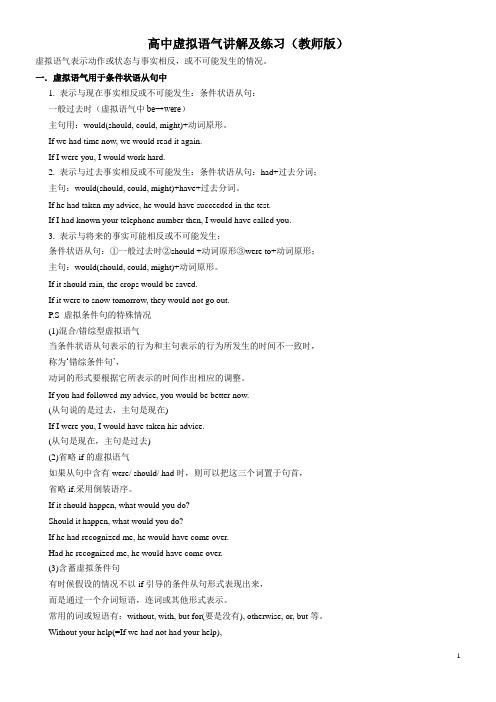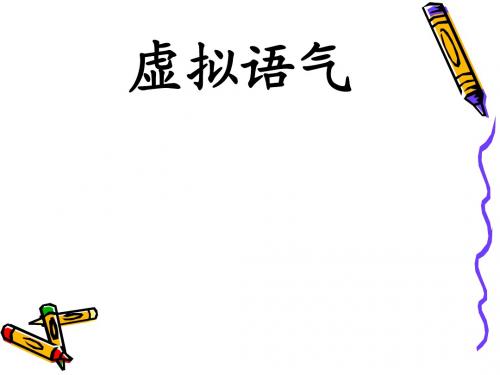虚拟语气 教师
- 格式:doc
- 大小:40.50 KB
- 文档页数:4

高中虚拟语气讲解及练习(教师版)虚拟语气表示动作或状态与事实相反,或不可能发生的情况。
一.虚拟语气用于条件状语从句中1. 表示与现在事实相反或不可能发生:条件状语从句:一般过去时(虚拟语气中be→were)主句用:would(should, could, might)+动词原形。
If we had time now, we would read it again.If I were you, I would work hard.2. 表示与过去事实相反或不可能发生:条件状语从句:had+过去分词;主句:would(should, could, might)+have+过去分词。
If he had taken my advice, he would have succeeded in the test.If I had known your telephone number then, I would have called you.3. 表示与将来的事实可能相反或不可能发生:条件状语从句:①一般过去时②should +动词原形③were to+动词原形;主句:would(should, could, might)+动词原形。
If it should rain, the crops would be saved.If it were to snow tomorrow, they would not go out.P.S 虚拟条件句的特殊情况(1)混合/错综型虚拟语气当条件状语从句表示的行为和主句表示的行为所发生的时间不一致时,称为…错综条件句‟,动词的形式要根据它所表示的时间作出相应的调整。
If you had followed my advice, you would be better now.(从句说的是过去,主句是现在)If I were you, I would have taken his advice.(从句是现在,主句是过去)(2)省略if的虚拟语气如果从句中含有were/ should/ had时,则可以把这三个词置于句首,省略if.采用倒装语序。


2013高考英语二轮复习精品资料专题08 情态动词和虚拟语气教学案(教师版)【2013高考考纲解读】情态动词主要用来表示说话人的情感、态度等,是中学英语语法的重点,也是高考的热点,是单项填空必考的一个知识点。
情态动词在高考中主要考查四点:情态动词表示推测和可能性的用法;情态动词与虚拟语气;情态动词表达“情感、态度、语气等”,情态动词表示“必要性”等方面的用法。
【重点知识整合】一、情态动词1.shall(1)表示命令、许诺、警告、强制、威胁、决心等,一般用于第二、三人称中,并用于陈述句。
You shall have my answer tomorrow.(允诺)你明天就会得到我的答复。
He shall be sorry for it one day,I tell you.(警告)我告诉你,他总有一天会后悔的。
You shall do as I tell you.(命令或吩咐)你应该按照我告诉你的去做。
(2)shall用于第三人称,表示“应,必须”。
Those belonging to our club shall wear uniforms.我们俱乐部的成员应该穿统一制服。
(3)用于征求对方的意见和指示,用在第一、三人称的疑问句中。
Shall I turn on the light?我能打开灯吗?Shall he come to see you? =Do you want him to see you?你愿意他来看你吗?【例】--What does the sign over there read?--No person____smoke or carry a lighted cigarette, cigar or pipe in this area.A. willB.mayC.shallD.must【答案】C【解析】:shall可以用于第二,第三人称表说话者的命令、警告、意图、允诺和决心等,此处表示命令.2.will(1)表示意志、愿望或决心等。

课时:2课时年级:八年级教学目标:1. 让学生了解虚拟语气的概念和用法。
2. 培养学生运用虚拟语气进行表达的能力。
3. 提高学生的英语听说读写能力。
教学重点:1. 虚拟语气的概念和用法。
2. 虚拟语气在句子中的运用。
教学难点:1. 虚拟语气在句子中的正确运用。
2. 虚拟语气与其他语气的区分。
教学过程:第一课时一、导入1. 教师用英语进行简短的自我介绍,引出今天要学习的主题——虚拟语气。
2. 学生用英语进行简短的自我介绍,复习所学知识。
二、新课讲解1. 教师讲解虚拟语气的概念,让学生了解虚拟语气的含义。
2. 教师举例说明虚拟语气在句子中的用法,让学生掌握虚拟语气的结构。
三、练习1. 教师给出一些虚拟语气的句子,让学生判断句子中的虚拟语气用法是否正确。
2. 学生互相练习,用虚拟语气造句。
四、小结1. 教师总结本节课所学内容,强调虚拟语气的概念和用法。
2. 学生对本节课所学内容进行回顾。
第二课时一、复习1. 教师提问上节课所学内容,检查学生对虚拟语气的掌握情况。
2. 学生回答问题,复习虚拟语气的概念和用法。
二、巩固1. 教师给出一些含有虚拟语气的句子,让学生判断句子中的虚拟语气用法是否正确。
2. 学生互相练习,用虚拟语气造句。
三、拓展1. 教师讲解虚拟语气在特定语境中的运用,如条件句、让步状语从句等。
2. 学生练习,用虚拟语气完成句子。
四、总结1. 教师总结本节课所学内容,强调虚拟语气在句子中的运用。
2. 学生对本节课所学内容进行回顾。
教学评价:1. 通过课堂提问和练习,了解学生对虚拟语气的掌握情况。
2. 通过课后作业,检验学生对虚拟语气的运用能力。

课程目标:1. 让学生了解虚拟语气的概念和用法。
2. 帮助学生掌握虚拟语气在句子中的不同用法,包括与现在事实相反、与过去事实相反和与将来事实相反。
3. 提高学生运用虚拟语气进行英语表达的能力。
教学对象:大学英语学习者教学时间:2课时教学准备:1. 教学PPT或黑板2. 课本或相关教学材料3. 练习题和答案教学过程:第一课时一、导入1. 通过日常生活中的例子引入虚拟语气的概念,如假设情景的描述。
2. 提问学生:“你们在生活中有没有遇到过需要用虚拟语气的情况?”二、讲解虚拟语气的概念和用法1. 解释虚拟语气的定义:虚拟语气是表示与事实相反或不可能实现的假设、愿望、建议等。
2. 讲解虚拟语气的基本结构:- 与现在事实相反:if + 主语 + were, 主语 + would/could/might/should + 动词原形- 与过去事实相反:if + 主语 + had + 过去分词,主语 +would/could/might/should + have + 过去分词- 与将来事实相反:if + 主语 + were to/should + 动词原形,主语 + would/could/might/should + 动词原形三、示例讲解1. 展示几个虚拟语气的句子,并解释其含义。
2. 让学生尝试翻译句子,加深对虚拟语气用法的理解。
四、练习1. 让学生完成一些关于虚拟语气的练习题,巩固所学知识。
2. 教师解答学生疑问,纠正错误。
第二课时一、复习1. 复习上一节课所学的虚拟语气概念和用法。
2. 通过提问或小组讨论的方式,让学生回顾所学内容。
二、深入讲解虚拟语气在特定语境中的运用1. 讲解虚拟语气在条件状语从句、让步状语从句、结果状语从句和目的状语从句中的运用。
2. 通过具体例句,让学生理解虚拟语气在不同从句中的用法。
三、练习1. 让学生完成更多关于虚拟语气的练习题,包括不同语境下的虚拟语气运用。
2. 教师解答学生疑问,纠正错误。

高中英语教师资格证面试备考-虚拟语气逐字稿试题:One of the most important discoveries during this period was how to draw things in perspective.This technique was first used by Masaccio in1428.When people first saw his paintings,they were convinced that they were looking through a hole in a wall at a real scene.If the roles of perspective had not been discovered,no one would have been able to paint such realistic pictures.By coincidence,oil paints were also developed at this time,which made the colours used in paintings look richer and deeper.Without the new paints and the new technique,we would not be able to see the many great masterpieces for which this period is famous.要求:(1)全英文授课;(2)设置学生犯错环节,并予以纠正;(3)有过程性评价(4)适当板书设计(5)语法课逐字稿:Warming-up:Good morning,boys and girls!How was your weekend?Pretty good?Oh,I am glad to hear that.Are you ready to start our English travel?Yeah?Fabulous!Lead-in:And before the class,I want to ask you a question,"Have you heard the song,if I were a boy?"Oh,I see all of you are nodding.The singer is a girl,so she can't be a boy.The sentence"If I were a boy"in the song is called the subjunctive mood.The subjective mood is used to express imaginations.And today we are going to learn the subjunctive mood.Presentation:OK,now please open the book and turn to page19,then read the passage and after reading I would like to ask someone to tell me the main idea.2minutes for you.Let's begin!Finished?Great!Any volunteers?Jack,please.You said that the main idea of the passage is"One of the most important discoveries during this period was how to draw things in perspective."Is he right?Yes,very good,sit down please.While reading the passage,have you noticed the italic sentence?Yes,the sentence is"If the roles of perspective had not been discovered,no one would have been able to paint such realistic pictures."And here are another two sentences on the ppt for you,what you need to do is to compare with them and find out the rules of subjective mood,Ok?The first sentence is"If he had taken my advice,he would not have made such a mistake."The second sentence is"If it had not rained so hard yesterday,we could have played tennis."Here2minutes will be given for you to observe.Time is up,what's the common rules or structures about the three sentences?Lucy,I see you put up your hand.The subordinate clauses are all"if subject+had+done",the main clauses are"subject+should/could/would+have done"Is she right?Yes,very clever,sit down,please.Practice:The rule we concluded just now is to represent the opposite fact in the past.And here are some photos which describle something that happeded in the past.4students form a group to discuss how to describle them with the subjunctive mood.3mintues for you.Finished?Who wants to have a try?Nick,please,you are a brave boy!He said if the second world war had not happened,China could develop better.Is he right?NO?The structure of the main clause should be...Nick,try again,if the second world war had not happened,China could have developed bettter.Yes,nicely done,you are a quick learner,sit down please.Anyone else?Mike,please.Good,sit down,please.Production:Now,I think most of you have mastered the rules.Then I would like to ask someone to fill in the following blanks.You can discuss with your partners,3minutes for you,let's begin.1.If I had got there earlier,I____(meet)her.2.If he had learnt this,he_______(not make)such a mistakes.3.She looked at me as if I_______(be)a stranger.OK,time is up,who wants to have a try?OK,Tom,Jack,Amy come to the stage.They finished,are they all right?NO?Which one is wrong?Yes the third one"would be"should change into"had been",because it's in the subordinate clause.Clear?Summary&Homework:So much for the class,who wants to share with us what we have learnttoday?Kate,please.Kate summerized very generous and she said that we have learnt the subjunctive mood when represent the opposite fact in the past.Very good,sit down please.And the subjunctive mood can also use to represent the opposite fact at the present or in the future.So today's homework is to find more information about the subjunctive mood and share with us on the next class.That's all for today,see you next time.。
高中虚拟语气教案一、教学目标1. 让学生理解虚拟语气的概念和用法。
2. 培养学生正确运用虚拟语气进行表达的能力。
3. 提高学生对英语语法的兴趣和积极性。
二、教学内容1. 虚拟语气的定义和分类2. 虚拟语气的构成和用法3. 虚拟语气在不同语境中的应用三、教学重点与难点1. 虚拟语气的定义和分类2. 虚拟语气的构成和用法3. 虚拟语气在条件句和愿望句中的应用四、教学方法1. 讲授法:讲解虚拟语气的定义、分类和构成。
2. 案例分析法:分析典型例句,展示虚拟语气的用法。
3. 练习法:设计练习题,让学生巩固所学内容。
4. 小组讨论法:分组讨论虚拟语气在实际语境中的应用。
五、教学过程1. 导入:引导学生思考虚拟语气的概念,激发学习兴趣。
2. 讲解:详细讲解虚拟语气的定义、分类和构成。
3. 示例:展示典型例句,分析虚拟语气的用法。
4. 练习:设计练习题,让学生进行虚拟语气的实际操作。
5. 讨论:分组讨论虚拟语气在条件句和愿望句中的应用。
6. 总结:回顾本节课所学内容,强调虚拟语气的关键点。
7. 作业:布置作业,巩固虚拟语气的运用。
六、教学评估1. 课堂问答:检查学生对虚拟语气概念的理解和运用。
2. 练习题:评估学生对虚拟语气构成和用法的掌握。
3. 小组讨论:观察学生在讨论中的表现,了解他们对虚拟语气的实际应用能力。
七、教学拓展1. 虚拟语气的其他用法:介绍虚拟语气在其他语境中的应用,如虚拟条件句、虚拟倒装句等。
2. 文化背景:讲解虚拟语气在英语文化中的特殊用法和表达习惯。
3. 实践任务:让学生运用虚拟语气编写一段对话或短文,展示其实际应用能力。
八、教学反思1. 总结本节课的教学效果,反思教学方法的适用性。
2. 分析学生的学习情况,针对性地调整教学策略。
3. 搜集学生反馈,了解他们对虚拟语气的掌握程度,为后续教学提供参考。
九、课后作业1. 复习虚拟语气的定义、分类和构成。
2. 完成课后练习题,巩固虚拟语气的运用。
虚拟语气练习一、用适当形式填空。
1. If people drove (drive) more slowly, there wouldn’t be so many accidents.2. Had you worked carefully, you wouldn’t have made (not make) so many mistakes.3. If it were to rain (rain)tomorrow, the football match would be put off (put off).4. If you had followed (follow) my advice, you would be better (good) now.5. If you had studied (study) the problem carefully, you would not find (not find) difficulty now.6. If he had taken (take)my advice, he would have succeeded (succeed)in the competition.7. But for the meeting, I would have gone (go) home at 6:00.8. I wish I had studied (study) hard while I was young.9. It is about time that fence were mended (mend).10. It is strange that the car should have broken (break) down at exactly the same place where it broke (break) down yesterday.11. The baby smiled as if he had understood (understand) what his mother said (say).12. ----- “Can we come in late tomorrow?”----- “I’d rather you came (come) in on time.”13. His suggestion that we should go (go)to Shanghai is wonderful.14. Mr. Jones would rather had stayed (stay) at home last night.15. Without your help, we couldn’t have finished (finish) the work ahead of time.16. The teacher demanded that the classroom (should) be cleaned (clean) at once.17. It is important that you (should) follow (follow) directions.18. He wishes that he were able to (able) pass the exam.19. It is a pity that he (should) fail (fail) the exam.20. Our only request is that this (should) be settled (settle) as soon as possible.二、翻译句子。
一、教案简介本教案旨在帮助学生理解虚拟语气的概念、用法和构成,并通过实例分析和练习,使学生能够熟练运用虚拟语气表达各种假设、愿望、建议等情境。
二、教学目标1. 了解虚拟语气的定义和作用;2. 掌握虚拟语气的构成和基本结构;3. 能够正确运用虚拟语气表达各种假设、愿望、建议等情境;4. 提高学生的英语口语和写作能力。
三、教学内容1. 虚拟语气的定义和作用;2. 虚拟语气的构成和基本结构;3. 虚拟语气的各种情境和用法;4. 虚拟语气的实例分析和练习。
四、教学方法1. 采用启发式教学,引导学生主动探究虚拟语气的知识和用法;2. 通过实例分析和练习,让学生在实践中掌握虚拟语气的运用;3. 组织小组讨论和互动,提高学生的口语表达能力和合作能力;4. 采用多媒体教学手段,增加课堂趣味性和互动性。
五、教学评估1. 课堂参与度和表现;2. 作业和练习的正确率和质量;3. 小组讨论和互动的表现;4. 英语口语和写作能力的提高。
六、教学步骤1. 引入虚拟语气概念:通过播放一段英文对话或短文,引导学生关注虚拟语气的用法。
2. 讲解虚拟语气构成:详细介绍虚拟语气的构成,如if条件句和倒装句等。
3. 分析虚拟语气情境:举例说明虚拟语气在各种情境中的应用,如假设、愿望、建议等。
4. 练习虚拟语气运用:让学生进行虚拟语气的填空、改写等练习,巩固所学知识。
5. 小组讨论:学生分组讨论虚拟语气的实际应用,分享自己的理解和例子。
七、课堂活动1. 角色扮演:学生分组进行角色扮演,用虚拟语气表达各种情境。
2. 写作练习:让学生运用虚拟语气编写一段故事或日记,展示所学成果。
3. 互动游戏:设计一个关于虚拟语气的互动游戏,增加课堂趣味性。
八、作业布置1. 虚拟语气练习题:布置一些有关虚拟语气的练习题,要求学生回家完成。
九、教学反思1. 回顾教学内容:总结本节课所讲解的虚拟语气知识和用法。
2. 分析学生表现:评估学生在课堂上的参与度、作业和练习的正确率。
虚拟语气与倒装句(教师版)什么就是虚拟语气(subjunctive mood)?If I were you, I would not do like this、要我就是您,我就不会这样做I wish I became a millionaire、要就是我就是个百万富翁多好啊口头解释上面两个例句后引出虚拟语气的概念表示说的话不就是真实发生,只就是一种假设,主观愿望,猜测,建议等非真实的情况。
今天主要讲在条件句中虚拟语气的使用情况Q: 那就是不就是所有的条件句都用虚拟语气?这里可以提问同学,进行互动后给出正确答案一.分类1、真实条件句,表示的假设就是有可能发生的,此时主句不用虚拟语气。
e、g、If I have time, I will do the homework、(口头解释分析这个句子)2、虚拟条件句,表示的就是一种假象,与事实相反或不太可能会发生,那就要用虚拟语气e、g、If I were you, I would do the homework、(口头解释分析这个句子)二.用法总结:从句都往过去推一个时态。
与现在相反--过去, 与过去相反--过去的过去(过去完成),与将来相反--过去三.重点解析1、l would/should/could/might主句谓语中的should主要用于第一人称后;would 表示结果还表示过去常常做某事,might表示可能性,could表示能力、允许或可能性。
比较: ①If you tried again,you would succeed、要就是您再试一试,您就会成功的。
(would表结果)②If you tried again, you might succeed、要就是您再试一试,您可能会成功的。
(might表可能)③If you tried again ,you could succeed、要就是您再试一试,您就能成功了。
(could表能力)2.错综时间虚拟条件句:即条件从句与主句所指时间不一致,如从句指过去,而主句即指的就是现在或将来,此时应根据具体的语境情况,结合上面提到的三种基本类型对时态作相应的调整If it had rained last night, the ground would be wet now、要就是昨晚下过雨的话,现在地面就会就是湿的。
单项填空1.—Were you in time for the lecture?—If I________told earlier,I would have.A.had been B.wasC.were to be D.should be答案与解析:A本题考查与过去事实相反的虚拟语气,根据此题的逻辑关系,应该用过去完成时的被动语态。
2.If I________plan to do anything I wanted to,I'd like to go to Tibet and travel through as much of it as possible.A.would B.couldC.had to D.ought to答案与解析:B根据句意和时态可知,此句表示与现在事实相反的虚拟语气,因此此处应用can的过去式could。
can在此处的意义为¡°可能,能够¡±。
3.But for your help,we________such a good chance.A.couldn't have gotB.couldn't getC.can't getD.can't have答案与解析:A此处表示与过去事实相反的虚拟语气,But for your help相当于¡°If we hadn't got your help¡±,因此后面的主句要用情态动词+have done。
4.He insisted that his suggestion________right and we________the plan into practice as soon as possible.A.was; put B.was; must putC.should be; should put D.should be; put答案与解析:A前面¡°坚持说¡±自己的建议是对的,故不用虚拟语气,后面表示他¡°要求¡±我们把计划付诸实践,故需用虚拟语气,should可省略。
5.His suggestion is that the harvest________in before the rainy season comes.A.be got B.getC.should get D.got答案与解析:A suggestion作主语,后面that引导表语从句,故应用should+do。
但表语从句的主语harvest是动作的承受者,因此应用被动语态,此处省略了should。
6.It's useless envying others their success.It's time you ________hard.A.must work B.were to workC.work D.worked答案与解析:D此处表示对将来的建议,故要用动词的过去式或should+do。
7.—Don't you think it necessary that he________to Miami but to New York?—I agree,but the problem is________he has refused to.A.will not be sent; thatB.not be sent; thatC.should not be sent; whatD.should not send; what答案与解析:B问句是it's necessary that...句式,故should可省略,根据逻辑关系,此处应用被动语态;答句考查表语从句的引导词,引导词本身无意义,也不作成分,故只能用that。
8.How nice it________if I________a sister like you!A.was; hadB.would be; had hadC.would have been; hadD.would be; had答案与解析:D根据语境判断,¡°我¡±希望有一个像对方一样的妹妹,但事实上没有。
因此本题考查与现在事实相反的虚拟语气,主句用would+do,从句用动词的过去式。
9.Jim would rather we ________ now,but we must go to work.A.not leave B.had not leftC.didn't leave D.not to be left答案与解析:C本题考查would rather中虚拟语气的使用。
其后从句中谓语动词要用过去式。
10.—I have succeeded in solving this problem.—________my advice,you ________ a great deal of difficulty with it.A.If you hadn't taken; would have hadB.If you didn't take; would haveC.Hadn't you taken; would haveD.If you didn't take; will have had答案与解析:A考查虚拟语气的用法。
从题干中的第一句话(have succeeded...)可以判断,下文是对过去发生事情的虚拟,所以从句应用过去完成时,即用¡°if+主语+had+过去分词¡±结构,也可以把had提前,省略if。
主句虚拟过去的情况,用would have done。
11.Yesterday Jane walked away from the discussion.Otherwise,she________something she would regret later.A.had said B.saidC.might say D.might have said答案与解析:D依据前句句意,可知讲述的是对过去事实相反的内容。
otherwise暗含了一种条件,等于if Jane hadn't walked away from the discussion。
12.Without the air to hold some of the sun's heat,the earth at night ________,too cold for us to live. A.would be freezing coldB.will be freezing coldlyC.would be frozen coldD.can freeze coldly答案与解析:A without表示的是与现在情况相反的假设,等于If there were not the air...。
freezing cold为固定用法,表示¡°极冷¡±。
13.Suddenly came an order that the enemy's defence works________.A.be destroyed B.should destroyC.would be destroyed D.would destroy答案与解析:A在order的同位语从句中也需用虚拟语气,谓语动词用¡°should+动词原形¡±或直接用动词原形。
同时此句中又表示被动含义。
14.If only we________the summer vacation together last year!A.would spend B.would have spentC.have spent D.had spent答案与解析:D if only=I wish(但愿),表达说话人的强烈愿望。
谓语动词用一般过去时表示现在没有实现的愿望,用过去完成时表示过去没有实现的愿望,常译为¡°要是¡¡就好了¡±。
15.I didn't know your mobile phone number;otherwise I________ you the second I got to Changsha.A.had rung B.would ringC.should have rung D.would have rung答案与解析:D本题考查虚拟语气在条件句中的运用。
otherwise相当于说:¡°If I had known your mobile phone number,I...¡±,当对过去情况进行虚拟时,主句要用would have done结构。
16.Were they still in Shanghai,Mr White________them.A.might seeB.might have seenC.may have seenD.would have seen答案与解析:A were they still in Shanghai=if they were still in Shanghai,由此可知,是对现在情况的假设。
17.—Would you come and join them?—I wish I________.But I am busy at this moment.A.can't B.couldn'tC.could D.can答案与解析:C答案could后省略了join them。
18.It's a pity that he ________ so careless.A.was B.will beC.should be D.can be答案与解析:C It is a pity/a shame/no wonder/...+that从句,表示惊讶、喜悦、惋惜、遗憾等语气,主语从句中的谓语动词用(should)+动词原形的形式。
19.—Sally ________ to come swimming with us.—What a shame she had to take a test!A.would love B.would have lovedC.should love D.should have loved答案与解析:B would love¡°愿意¡¡¡±;would have loved¡°本愿意¡¡¡±;should love¡°愿意¡¡¡±;should have loved¡°本应该愿意而事实上并不愿意¡±。